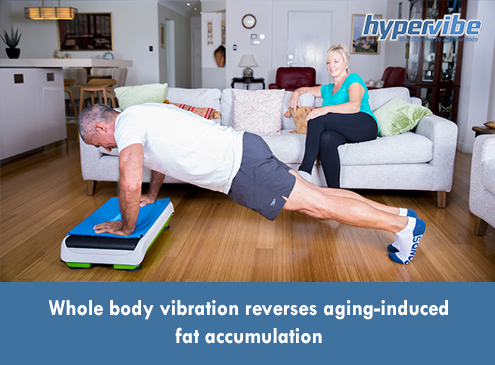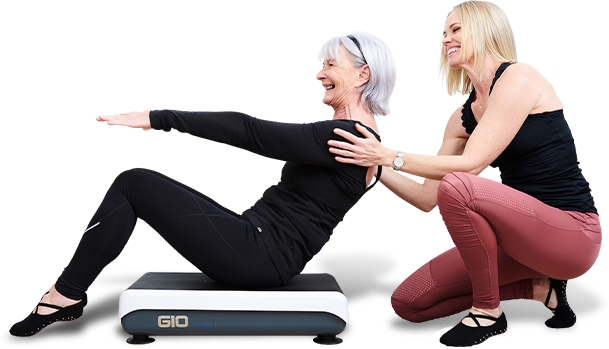Whole body vibration reverses aging-induced fat accumulation
One’s body composition and shape changes naturally with age. Some of these aging-induced changes cannot be prevented, but others can be slowed down or minimized through lifestyle and diet changes.
The natural decrease in bone and muscle mass starts around the age of 30. After this point, one tends to lose the lean tissue easier, especially with a sedentary job. At the same time, fat accumulates easier, and it’s not the fat cells underneath the skin that are the most problematic for one’s overall health, but visceral fat.
The amount of body fat after the age of 30 goes up steadily and builds up mostly in the abdominal area, around the waist and around the internal organs. But after a certain point, the layer of fat underneath the skin tends to get thinner, while the fat around the internal organs tends to increase in volume.
The changes in hormone levels also influence the way fat accumulates and is stored inside the body. In men, testosterone levels start to decrease with aging and most men gain weight until around the age of 50-60, then they begin to lose fat. In women, the weight gain can continue up to around 65 years, then they begin to lose fat.
What’s important to realize is that body weight is not the same with fat weight. The human body consists of various types of tissues, and most of the body weight is given by muscles and bones, but fat tissue contributes to the total body weight as well. However, fat tissue is less dense and lighter than the same amount of lean tissue, so one can lose body weight by losing muscle and bone mass, but gaining fat weight.
This means that one may look heavier and less toned with less muscle and more fat, although their total body weight is lower. Weight loss later in life occurs because fat tissue replaces lean muscle tissue, so if you want to prevent this, you have to find a way to maintain lean tissue while keeping fat tissue at a minimum.
Fortunately both diet and exercise can help with this. Regular exercise, regardless of its type, as well as a balanced diet that consists mostly of unprocessed food, as well as getting enough sleep and avoiding alcohol use can help in maintaining a healthier body composition and weight.
The type of exercise you choose to practice for maintaining a healthy body composition and weight does matter, as strength training and weight lifting is more effective in toning and strengthening your body than cardio exercise, but cardio is still useful for burning calories at high rates.
If you want to combine these two, you can stick to 30 minutes of cardio for example and add 10 minutes of whole body vibration, which is similar in terms of results to conventional strength training. Moreover, WBV seems to be effective in preventing the accumulation of excess fats around the waist and internal organs.
Whole body vibration can help in preventing visceral fat accumulation
Dutch researchers from the University of Groningen recently investigated the effects of vibration exercises on aging-induced visceral fat accumulation in mice. Their study, published in the PLoS journal, compared the effectiveness of whole body vibration in reducing adiposity in mice, compared to sham training.
The investigation lasted for 14 weeks, mice being exposed to WBV for 10 minutes a day, five days per week. The metabolic parameters and energy balance parameters were measured, showing that in old mice, vibration therapy can significantly decrease visceral fat mass as well as the levels of triglycerides in the liver, regulating the use and the levels of blood glucose at the same time.
WBV was found to stimulate the hepatic lipid oxidation, helping the body use its stored fats more efficiently, and to alleviate the negative effects of fatty liver. These effects however weren’t seen in young mice. The researchers concluded that in old mice, whole body vibration contributed to a reduction in total body fat by stimulating the hepatic lipid metabolism.
Whole body vibration therapy tended to increase the hepatic glycogen utilization during fasting, and to increase the utilization of blood glucose, and was effective in reducing the white fat mass.
A couple of year ago, scientists at the University of Antwerp published a study in the journal of Obesity Facts that showed that combining either aerobic exercise or whole body vibration training with caloric restriction can help one lose 5-10% of their body weight (mostly fat mass), after 6 to 12 months of training.
In the first three months of this study, subjects only performed static exercises, while in the last three months they switched to dynamic exercises. All major muscle groups were targeted, and participants were encouraged to maintain an active lifestyle in the follow-up period (6 to 12 months), and they had to meet with the study dietician twice per month, to analyze the progress.
The body weight of participants in all groups decreased significantly after 3, 6 and 12 months, the most impressive results for the Vibration group being experienced between month 3 and 6 post research. After 3 months, subjects in the Fitness and Vibration groups experienced a significant decrease in the total body fat percentage.
The Diet, Fitness and WBV groups experienced a significant reduction in visceral adipose tissue after 3 months, and in the whole body vibration and Diet groups the reduction of VAT (visceral adipose tissue) was still significant after 6 months. However, 12 months after the study, participants in the Diet and Fitness groups experienced an increase in the percentage of visceral fat, so only the subjects in the WBV group were able to maintain the results.
Moreover, subjects in the whole body vibration group (those who performed WBV exercises and followed the diet) were the only ones to experience a decrease in the WHR (waist-hip-ratio) after 3, 6 and 12 months. The waist circumference decreased the most in the WBV group, and there was a significant decrease in the levels of triglycerides in the Vibration group after 3 months.
This study showed that whole body vibration, coupled with a hipocaloric diet, can help obese and overweight people lose not just body weight but visceral fat, reducing their risk of developing metabolic syndrome.
Have something to add to this article? Comment below or join our Facebook community and share your thoughts with us!














